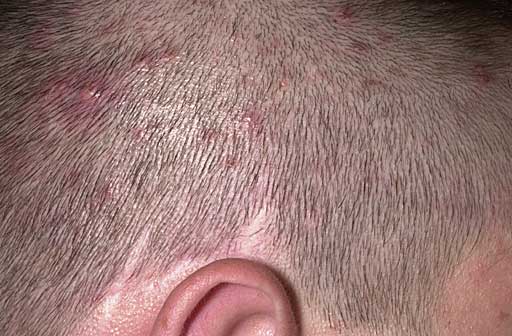


Scalp ringworm has been around for centuries and is most common in children, though it has struck adults as well. It doesn’t have a certain geographic location. Common misconceptions have many people believing that a worm causes this condition. Ringworm on the scalp is caused instead by a fungus and only gets its name because of the circular shape that looks like a ring that forms the infection.
Also known as tinea capitis, the infection sets in on your scalp and hair shafts and is highly contagious. If your child has this condition, it is advised that you keep them home to treat it.
Tinea capitis can affect only parts of your scalp or all of it. The most common symptoms of the condition are:
 Itchy patches
Itchy patchesIn more severe cases of scalp ringworm, kerion may develop. These are crusty swellings that can lead to you being permanently bald in spots. The swellings also leak pus and scar if not taken care of right away.
Fungi known as dermatophytes are the cause of ringworm on the scalp. This type of fungi exists on dead tissues that are found on your hair, the top layer of your skin, and your fingernails.
Scalp ringworm is highly contagious and very easy to spread, especially among children. Causes of the condition are listed below:
Remember, overcrowding and not being clean can also increase the chance of contracting scalp ringworm. Dermatophytes prefer to live in warm, moist environments, which means that ringworms love to live on sweaty skin. Proper hygiene is important for prevention and getting rid of scalp ringworm.
Once it has been determined that you have scalp ringworm, the next step is treating it. Below are some of the most common treatment methods:
 An anti-fungal oral medication is needed to clear up scalp ringworm.
An anti-fungal oral medication is needed to clear up scalp ringworm.
Griseofulvin is an antifungal medication that has been the number one choice of doctors for many years now. This can be gotten in liquid or pill form and need to be taken for 8-12 weeks.
The other most common form of antifungal oral medication is Terbinafine. While it has not been officially licensed to be used for scalp ringworm, it has become a very popular treatment as it does work. This treatment is recommended for four weeks and needs to be completed to be completely effective.
Two other medicines that are sometimes used include itraconazole and fluconazole.
Shampoo infection treatments are used as well to treat scalp ringworm. While shampoos and creams cannot clear up the infection by themselves, they are used to help the treatment along. It is recommended that an antifungal shampoo infection treatment should be used at least twice a week along with the oral treatment that your doctor will prescribe. Possible shampoos and creams to use include the following:
Using one of these shampoos or creams will help clear up any surface fungi fast, which will stop it from spreading to other children.
It is important to be patient as curing scalp ringworm is a slow process. Ask your doctor before sending your child back to school and cover bald spots with a scarf.
To prevent the ringworm from spreading, make sure to wash everything at home and throw away brushes and combs. Make sure to examine pets for signs of ringworm as well.
To prevent the ringworm from returning, tell your children about the dangers of sharing combs, brushes, and hats. Also, examine your pets often for signs of ringworm.